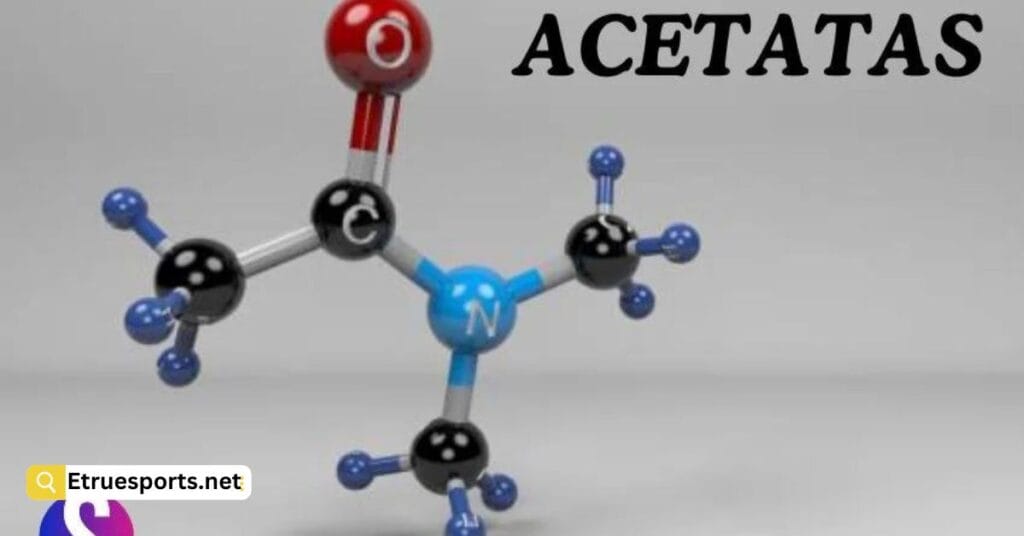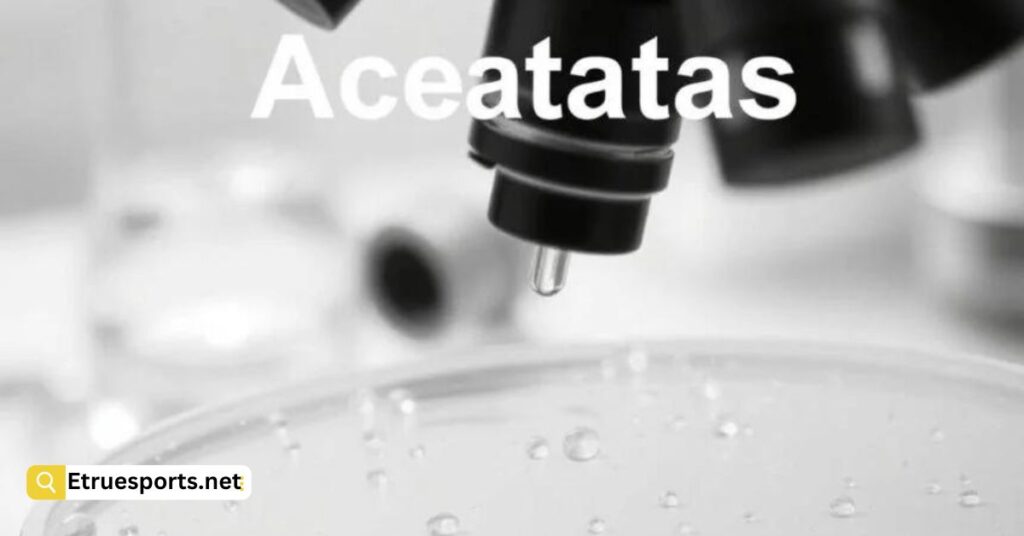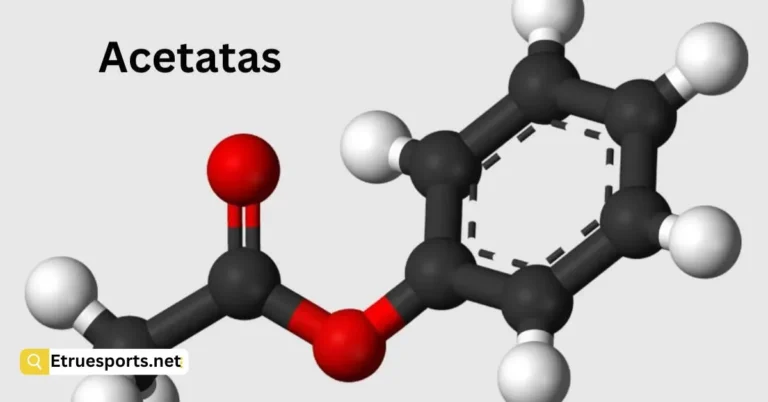Acetatas, also known as acetate in many regions, is a vital compound in both organic chemistry and biological processes. It plays a significant role in various industries, including pharmaceuticals, biotechnology, food, and many more. This article will provide an in-depth analysis of acetatas, covering its chemical composition, applications, importance in different fields, and much more. Let’s dive into everything you need to know about acetatas.
What is Acetatas?
Acetatas, or acetate, is a salt or ester of acetic acid. Chemically, it is represented by the formula CH₃COO⁻, where the negatively charged acetate ion forms from the dissociation of acetic acid. It compounds are typically found in liquid or solid form, depending on the cation (positively charged ion) they bond with, such as sodium (Na+), potassium (K+), or calcium (Ca2+).
Chemical Properties of Acetatas
It is characterized by its ability to act as a buffer, which means it can stabilize the pH of solutions. It’s also a good solvent, making it valuable in several chemical reactions. Some other properties include:
- Molecular formula: CH₃COO⁻
- Molecular weight: 59.04 g/mol (for acetate ion)
- Boiling point: Decomposes before boiling
- Melting point: Depends on the form (usually 324 °C for sodium acetate)
Role of Acetatas in Biology
In biological systems, it plays a crucial role in metabolism. It is one of the primary molecules involved in the citric acid cycle, also known as the Krebs cycle, which is a key energy-producing process in living organisms.
Acetatas in Energy Production
In the body, it acts as a substrate for acetyl-CoA, a molecule that is essential in the breakdown of carbohydrates, fats, and proteins for energy. This process is crucial for ATP (adenosine triphosphate) production, which powers cellular functions. Thus, it is not only vital for metabolism but also for overall energy balance in organisms.
Acetatas as a Neurotransmitter
It also serves as a precursor for the synthesis of acetylcholine, a neurotransmitter that plays a significant role in muscle movement, memory, and cognitive functions.
Industrial Uses of Acetatas
It is widely used across various industries due to its versatile properties. Below are some of the key industries where it plays a significant role:
Pharmaceutical Industry
In the pharmaceutical industry, it compounds are used in drug formulation and as a buffer in medicines. Sodium acetate, in particular, is used to maintain pH levels in intravenous solutions, while calcium acetate is used to control phosphate levels in patients with kidney disease.
Food Industry
It is also commonly used as a food additive, where it acts as a preservative and flavor enhancer. Sodium acetate is a popular food-grade it used in snacks like chips, where it imparts a salty, vinegar-like flavor.
Chemical and Manufacturing Industries
In chemical manufacturing, it is employed as a solvent and reagent in a variety of reactions. In the production of textiles and plastics, it based solutions help in dyeing processes and the manufacturing of adhesives and coatings.
Acetatas in Biotechnology

One of the most important roles of it in biotechnology is in DNA and RNA extraction. Sodium acetate is often used to precipitate nucleic acids, making it easier to separate them from other cellular components.
Acetatas in Molecular Biology
It is crucial for maintaining the integrity of DNA and RNA during various laboratory processes. Its buffering capacity allows it to stabilize the pH of solutions, ensuring that biological samples remain intact for analysis and experimentation.
Environmental Impact of Acetatas
While it is generally regarded as safe for use in food and pharmaceuticals, it is essential to consider its environmental impact, especially in large-scale industrial applications.
Biodegradability of Acetatas
Fortunately, it is a biodegradable compound, meaning it breaks down into harmless substances in the environment. It based products, particularly those used in food and pharmaceutical industries, are generally considered environmentally friendly.
Waste Management of Acetatas
Industries using it must ensure proper waste management techniques to prevent any adverse environmental effects. In cases of large-scale use, improper disposal can lead to water contamination or soil degradation.
Safety and Precautions
Although it is safe for use in many applications, it is important to handle it with care, especially in industrial settings. Below are some safety tips when working with acetatas:
- Avoid inhalation: Exposure to powdered it can cause respiratory irritation. Use a mask or respirator in settings where it is used in its powdered form.
- Use protective gear: Gloves and safety glasses should be worn when handling concentrated forms of it, especially in laboratories or manufacturing plants.
- Proper ventilation: Ensure adequate ventilation when working with it to prevent the buildup of harmful fumes, particularly when heated.
Common Forms of Acetatas
It is available in different forms depending on its specific application. Some of the most commonly used forms include:
Sodium Acetatas
Sodium acetatas (CH₃COONa) is a widely used salt form of this. It is utilized in food processing, as a buffering agent in pharmaceuticals, and in laboratories for DNA precipitation.
Calcium Acetatas
Calcium acetatas (Ca(CH₃COO)₂) is often used in the treatment of hyperphosphatemia (high phosphate levels in the blood) for patients with kidney issues. It also finds applications in the food industry as a stabilizer and preservative.
Potassium Acetatas
Potassium acetatas (CH₃COOK) serves as a de-icing agent for roads and aircraft, especially in areas with strict environmental regulations where traditional de-icing agents might be harmful.
Benefits of Acetatas

Acetatas compounds offer numerous benefits across various fields, including:
- pH regulation: It compounds, especially sodium and potassium acetate, are widely used as buffers to maintain pH in chemical and biological solutions.
- Biodegradability: It is environmentally friendly and breaks down easily in nature, making it a suitable choice in eco-conscious industries.
- Versatility: It finds applications in multiple industries, ranging from food and pharmaceuticals to manufacturing and biotechnology.
- Safety: When used in regulated quantities, it is generally safe for consumption and use in industrial processes.
Potential Risks and Concerns
While it is considered safe for most applications, there are a few concerns and risks to be aware of:
- Overconsumption: Excessive intake of acetatas-based preservatives in food can lead to gastrointestinal discomfort in some individuals.
- Industrial hazards: Workers handling large amounts of it should follow safety protocols to avoid respiratory and skin irritation.
- Environmental concerns: While biodegradable, the improper disposal of it in large quantities can still have localized environmental impacts.
Future of Acetatas in Science and Industry
The future of it is bright, with continued research and development leading to new applications. Some of the areas where it is expected to grow include:
Acetatas in Renewable Energy
Researchers are exploring the use of it in renewable energy applications, particularly in biofuels. It could serve as a feedstock for the production of bioethanol, a cleaner alternative to fossil fuels.
Biotechnology and Acetatas
As molecular biology techniques advance, the use of it in DNA and RNA extraction, as well as gene editing technologies, is expected to increase. The compound’s role as a buffer and stabilizer will remain vital in these fields.
Conclusion
Acetatas is a versatile and essential compound with widespread applications in multiple industries, from pharmaceuticals and food to biotechnology and environmental sustainability. Its unique chemical properties and relatively low environmental impact make it an invaluable tool in both industrial and biological processes. As research continues, acetatas is poised to play an even greater role in future scientific and technological advancements.
Whether you are working in a lab, managing a production line, or just curious about the chemical world, understanding it and its numerous applications is key to unlocking its full potential.
Read More: Toastul: Your Guide to Perfectly Toasted Bread Every Time








